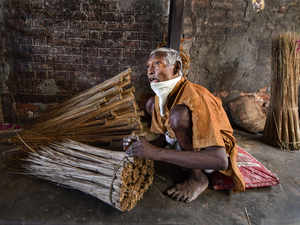 PTI
PTIOn May 9, many Indians woke up to photographs of rotis, slippers, clothes and possibly limbs strewn on the railway line between Jalna and Aurangabad in Maharashtra where 16 migrant workers, having dozed off on the tracks after having walked 36 km of an 850 km journey home, were run over by a freight train.
Even in a country that has become inured to inequality, injustice and the cruelty of the state, the sight of those scattered rotis should have stung like a whip. Unfortunately, this is far from the case. The Indian middle class, long accustomed to turning its back on suffering, is now asking why these workers were sleeping on the railway line, and whether they had planned ‘mass suicide’.
Such speculations are undeterred by survivors’ accounts of exhaustion, police harassment driving them to the tracks, the mistaken belief that trains were not running and, above all, the psychological and physical consequences of State abandonment, dulling the awareness of risk.
But the labouring classes, especially poor tribals in the lowest stratum of the workforce, are not supposed to have a psychology, far less a limit to their physical endurance. Those who ask why people fall asleep on railway lines are unlikely to have walked 36 km through the night with the railway track providing the only sense of direction.
Nor do they know what risk means for workers whose money has run out, who have no wages, cannot pay rent, and receive relief intermittently or not at all. The day before the Aurangabad tragedy, Krishna Sahoo and his wife Pramila, trying to cycle home with their two young children from Lucknow to Bemetara in Chattisgarh, a distance of 700 km, were run over almost immediately by an unidentified vehicle.
They were killed, their children orphaned. Figures up to May 9 count 69 workers killed in road and rail accidents while trying to reach home since the lockdown began, sometimes stowing away in trucks and buses.
Not counted are those who died of heat and exhaustion on the road, almost in sight of their destination, like the 12-year-old Jamalo Makdam on April 18 in Chhattisgarh.
Yet, on March 31, a week into the lockdown, Solicitor General Tushar Mehta assured the Supreme Court on oath that not a single migrant was on the road any longer: they had all been taken to shelters and provided with food and water.
This was patently untrue. Since then, migrant workers have been crammed by police into container trucks; buses transporting them have been stopped at state borders; trains have been announced and then cancelled; and they have been forced to pay enhanced fares for the few buses and trains that started running from May 1.
Unsurprisingly, there have been protests and violence at bus and train stations. Meanwhile, the lines of those who are trying to walk or cycle home remain unending. Around 120 million of India’s population are seasonal or longerterm migrants from rural to (largely) urban markets.
More than 80% of a workforce of around 450 million is in the informal, unorganised sector, without assured wages unless they can work. Most have received no wages during lockdown.
The task of providing these jobless labourers (in-state or out-of-state) and their families with food was delegated by the Centre to the states. Only 17.5 lakh tonnes of foodgrains have been lifted so far from the overflowing Food Corporation of India (FCI) godowns (containing 560 lakh tonnes).
Many states are relying on NGOs and volunteer groups to reach the hungry. Rations are insufficient even for those with ration cards, and migrants do not have them. Most are not registered with state labour departments. As to shelter, unpaid rent means that millions face eviction — though Chief Justice Sharad Bobde says migrants do not need money if they get food.
In the next phase, changes to labour laws will mean less security and longer hours. The decision to walk home pits exploitation, eviction, hunger and joblessness, against the risks of the road, home, family, possibly work on the land. Which would you choose? The decision to lock down this country at four hours’ notice rendered a huge segment of its working population, at a stroke, dependent on handouts.
The operative word here is ‘working’. The Indian middle class likes to commiserate with the poor, setting up community kitchens, donating to ‘relief funds’. But these people we see collapsing on the road, getting run over by trains, leaving their scorched rotis on the tracks, are not the faceless, nameless poor whose ‘relief ’ sends a thrill of piety through our middle-class hearts.
They are workers who can justifiably claim the right to livelihood and the dignity of their labour. They did not work all their lives to squat on the road for free meals. They are individuals, persons who decide to go or to stay.
The rotis they left on the tracks were theirs, made by the same hands that laid bricks and carried loads. Only the death that comes to them, like a monster on the tracks, is not of their making.
The writer is professor emerita, Jadavpur University, Kolkata
(Catch all the Business News, Breaking News, Budget 2024 Events and Latest News Updates on The Economic Times.)
Subscribe to The Economic Times Prime and read the ET ePaper online.
(Catch all the Business News, Breaking News, Budget 2024 Events and Latest News Updates on The Economic Times.)
Subscribe to The Economic Times Prime and read the ET ePaper online.









 Get Unlimited Access to The Economic Times
Get Unlimited Access to The Economic Times
